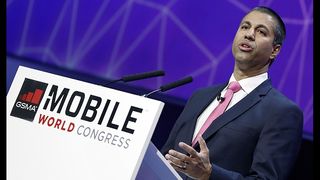Oracle Backs Pai’s FCC Title II Rollback

Silicon Valley powerhouse Oracle has given FCC chairman Ajit Pai's Title II rollback proposal a thumbs up, saying it is an "important and positive" step forward in "modernizing regulations in the complex and converging broadband world."
That includes reclassifying ISPs as information services and returning the FTC to the broadband enforcement beat.
That endorsement came in a letter to Pai dated Friday from Oracle senior VP Kenneth Glueck and obtained by B&C. Oracle is one of the Silicon Valley companies Pai met with recently to seek input on next steps for net neutrality, including "securing online consumer protections."
Pai is proposing to un-classify ISPs as Title II (common carrier) telecommunications services, get the FCC out of the interconnection regulation business under Title II, eliminate the "general conduct standard" for reviewing ISP business and network management practices and review the Open Internet rules against blocking, throttling or paid prioritization of content.
That is in the form of a Notice of Proposed Rulemaking teed up for a May 18 vote, which will ask a lot of questions about how to preserve net neutrality going forward.
Oracle is no fan of the FCC's Open Internet order reclassifying ISPs under Title II. "[T]he stifling open internet regulations and broadband classification that the FCC put in place in 2015 – for just one aspect of the internet ecosystem – threw out both the technological consensus and the certainty needed for jobs and investment," Glueck said, clearly preaching to the choir when it comes to the new chairman, who voted against the order citing similar concerns.
Glueck also said that, from the company's perspective, what should have been a tech discussion about traffic management had morphed into a hyperbolic political battle "substantially" removed from reality.
Broadcasting & Cable Newsletter
The smarter way to stay on top of broadcasting and cable industry. Sign up below
That reality, it suggests, is that power resides not just in ISPs but in the other internet actors.
"As an architect and provider of technologies throughout the communications stack and public internet, Oracle powers the routing and transformation of data by the many actors in the internet ecosystem – bringing content and services to customers," Oracle said. "The concept that traditional internet access providers are exclusively transmitting unchanged data point-to-point is foreign to our own experiences and observations. And, focusing only on traditional internet access providers ignores the largest and most dominant internet players from a consumer perspective."
The company applauded the move to reclassify internet access as an information service, as well restoring authority to the Federal Trade Commission, saying it will "eliminate unnecessary burdens on, and competitive imbalances for, ISPs while enhancing the consumer experience and driving investment."
It calls the FTC "an impartial cop on the broadband beat with authority to reach all of the participants in the internet economy."
Reversing the Title II classification would immediately return broadband privacy oversight to the FTC, which could also potentially police net neutrality pledges made by ISPs under voluntary commitment, something Pai is said to have been considering as one possible approach.
“While not totally surprising, the strength and clarity of Oracle’s statement in support of Pai’s proposed rollback is certainly welcome," said Randolph May, president of Free State Foundation, a free market think tank backing the rollback. " Oracle is a major supplier of key components of the Internet’s infrastructure, and it has to be concerned about the current regime’s adverse impact on investment by Internet service providers. Oracle’s recognition that it is wrong-headed to regulate ISPs so much more harshly than the content providers is welcome, too. Without naming names, Oracle reminded those who will listen that power resides not just in ISPs, but with the edge providers. Maybe at some point, many more tech companies will realize its a dangerous game they are playing. Remember the old saying: ’Those who ride on the back of a tiger are likely to end up inside.’ In this case, that means that the Internet giants like Google, Facebook, Amazon, and so forth, may end up inside the harmful regulatory regime that want to maintain for the ISPs.”
Contributing editor John Eggerton has been an editor and/or writer on media regulation, legislation and policy for over four decades, including covering the FCC, FTC, Congress, the major media trade associations, and the federal courts. In addition to Multichannel News and Broadcasting + Cable, his work has appeared in Radio World, TV Technology, TV Fax, This Week in Consumer Electronics, Variety and the Encyclopedia Britannica.

